As parents in Dubai, we constantly worry about our children’s safety—whether they’re walking home from school, playing outside, or simply arriving at the house before we do. Traditional keys can easily be lost, duplicated, or fall into the wrong hands, leaving families vulnerable. Enter smart locks—a modern solution that promises enhanced security, convenience, and peace of mind. But are smart locks truly safe for children, and how do they fit into a busy family’s life?
Why Parents in Dubai Are Turning to Smart Locks
Dubai’s fast-paced lifestyle and rising demand for home security have driven many families to upgrade to smart locks. Unlike traditional locks, smart locks eliminate the need for physical keys and use PIN codes, fingerprints, or smartphone apps to control entry. For parents, this means:
- No more worrying about kids losing keys at school or on playdates.
- Real-time notifications when children arrive home safely.
- The ability to unlock doors remotely for emergencies or trusted visitors.
How Smart Locks Improve Child Safety
- Eliminate Lost Keys
Children are naturally forgetful, and lost keys can be a major safety concern. With smart locks like the Philips DDL610-5HWS, each family member can have a unique access code or fingerprint, completely removing the risk of misplaced keys. - Track Who Comes and Goes
Worried if your child arrived home safely? Smart locks such as the Philips DDL720-MVP-17HWS send instant mobile alerts whenever the door is unlocked, giving parents peace of mind even when they’re at work. - Control Access Anytime, Anywhere
Through the Philips EasyKey app, parents can unlock doors remotely for children who forget their code or let in babysitters or relatives while away. Temporary PIN codes can also be issued and revoked instantly. - Enhanced Tamper Protection
Models like the Philips DDL801-5HBS include tamper alarms and lockout modes that trigger if someone enters multiple incorrect PINs, keeping your home protected even if your child accidentally shares their code.
Teaching Kids Responsibility Through Smart Locks
Smart locks don’t just protect your home—they also help children develop a sense of independence. By assigning each child their own PIN code and explaining the importance of keeping it private, parents can teach digital responsibility.
Example: A 10-year-old returning home from after-school activities can safely unlock the door without the fear of losing a key. Parents receive an alert the moment they arrive, building trust while maintaining oversight.
Real-Life Scenarios Where Smart Locks Help
- After School Arrivals: Parents working late can monitor exactly when children enter the home without having to call or text repeatedly.
- Emergency Situations: If your child gets locked out or needs help, you can instantly unlock the door remotely.
- Family Trips: Provide grandparents or caregivers with a temporary PIN while you travel, and revoke it once you return.
Are Smart Locks Really Secure for Children?
Yes—when used correctly, smart locks provide greater security than traditional locks. Dubai parents especially benefit from:
- Encrypted digital keys that can’t be duplicated.
- Multiple access options (PIN, fingerprint, smartphone) tailored for each family member.
- Real-time alerts and logs to track every entry.
However, children must be taught not to share access codes and parents should routinely update codes for added safety.
Which Philips Smart Locks Are Best for Families?
- Philips DDL610-5HWS: Compact and perfect for apartments, supports unique codes and fingerprint access.
- Philips DDL720-MVP-17HWS: Premium palm vein and fingerprint recognition, ideal for villas.
- Philips DDL801-5HBS (Red Dot Award Winner): Stylish push-pull design, multiple access methods, and excellent for busy families.
Conclusion: A Safer, Smarter Way to Protect Your Kids
For Dubai parents, smart locks are more than a convenience—they’re an investment in family safety. By eliminating lost keys, providing real-time monitoring, and integrating with other smart devices, they ensure children are safe and accounted for at all times.
Upgrading to Philips smart locks gives you control, visibility, and the confidence that your home and kids are always protected.



